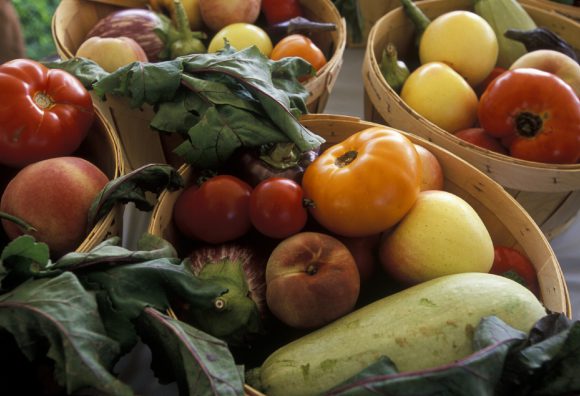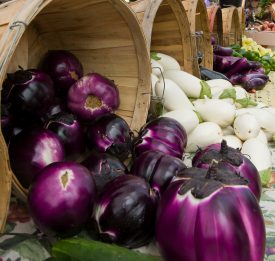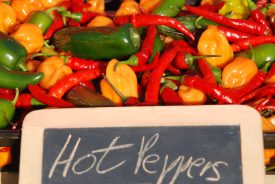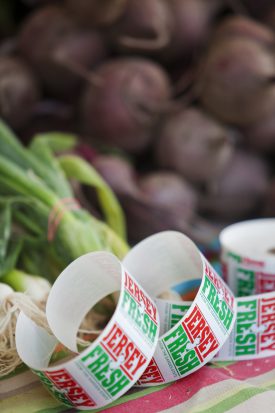
CSA shares can provide a weekly bounty of fresh fruits and vegetables.
So many people recognize the merits of committing to a regular exercise regime through gym membership. Fitness centers offer an array of equipment – variety you couldn’t duplicate in a home gym, and are frequented by people with similar goals that can offer support and advice on training. Paying for a membership adds to the incentive to use a facility, sealing the deal with financial commitment.
This concept can work for people who have other goals in mind: Looking to lose weight or improve your health by eating a healthy diet? Want to get more bang for your buck for your fresh produce? Looking for a way to ensure that your food is farm fresh and/or organic? Want to expand your horizons and try new foods? Looking to put buying local and supporting small businesses into practice?
Of the different ways to obtain fresh local foods, one of the intriguing options is the Community Supported Agriculture (CSA) arrangement. A CSA offers “shares” of the farm’s bounty to members during the growing season, requiring upfront payment in exchange for weekly portions throughout the season. By paying before or at the beginning of season, the farmer has cash flow that typically is not available at the time of year when production gets going, and CSA members in turn, share the abundance of the farm’s harvest.
 This alternative method of distribution requires some adjustment by both farmers and customers and hence is not always an attractive arrangement for some. While growers can benefit from planning and providing for a set number of shares with stable income, they need to make arrangements to either have members pick up shares at their farm, or deliver shares to a drop off location. CSA members are taking on the challenge of dealing with an assortment and abundance of food each week that requires creativity to work into meal plans and need to be available for scheduled pick up times.
This alternative method of distribution requires some adjustment by both farmers and customers and hence is not always an attractive arrangement for some. While growers can benefit from planning and providing for a set number of shares with stable income, they need to make arrangements to either have members pick up shares at their farm, or deliver shares to a drop off location. CSA members are taking on the challenge of dealing with an assortment and abundance of food each week that requires creativity to work into meal plans and need to be available for scheduled pick up times.
The rewards, however, are numerous, and the fact that many farms are offering CSAs and creative arrangements and lots of CSAs have members come back year after year, confirms the value CSAs offer. CSA shareholders that have farm pick up often enjoy visits to the farm – it is a chance to bring the kids on an outing, and get to know the farm staff. CSAs often provide newsletters with a summary of the week’s harvest and recipes. Just as members are met with sometimes unexpected offerings that broaden their menu planning, they also are asked for feedback for what they want grown the next season. “Loved the turnips! More of those purple carrots! Too much squash!” For smaller families that can’t use up an abundance of produce each week, there are half shares, or they can split a share with friends, neighbors or relatives – this can also be an opportunity to negotiate with your share partner for preferred or needed items. “You take the radishes this week, I still have some leftover from last week.”
Some farms that participate in community farmers markets use this as an opportunity to incorporate a CSA, where members can pick up their pre-packed box at the farm market. Some may offer a “market-style CSA,” like Chickadee Creek Farm of Pennington, NJ where shareholders are given a discounted debit account and pick out their produce at Chickadee’s various community farm market stands using their account credit.
 Many CSAs offer an element of surprise in their shares. Some farms include a few unique offerings like garlic scapes, pea shoots, or ground cherries – seasonal delights that aren’t available in supermarkets. Fresh flowers, herbs, eggs and even Jersey seafood may be available through CSAs.
Many CSAs offer an element of surprise in their shares. Some farms include a few unique offerings like garlic scapes, pea shoots, or ground cherries – seasonal delights that aren’t available in supermarkets. Fresh flowers, herbs, eggs and even Jersey seafood may be available through CSAs.
Rutgers New Jersey Agricultural Experiment Station participates in a multi-state team to develop and deliver educational programming on agritourism to assist Northeast farmers to use their farms to market directly to consumers. CSAs, like pick-your-own operations, are a way for farmers to offer more opportunities for customers to access their farm products. Members of the project team have observed the implementation of different strategies to make CSAs more consumer-friendly. For instance, over the past decade, as the number of CSAs in New Jersey increased, farms have offered more convenient options to accommodate shareholders. Gloucester County agricultural agent Michelle Infante-Casella observed, “In our area of South Jersey we are finding an increase in home/office delivery CSA models.” Recognizing that consumers will pay for convenience, Infante-Casella added, “Most customers are very busy and have little time to travel to rural areas for weekly pick-ups at the farm. Many CSA’s have marketed to business complexes, schools, hospitals and other locations with multiple employees for a once-a-week box drop-off, usually during lunch breaks.”
Infante-Casella noticed that the number of CSA’s in the state has now leveled off and are not increasing like in the past couple of decades. She added, “My hypotheses is that other high-end specialty food stores stock more local options (Whole Foods, Wegmans, etc.) and home food delivery services like “Blue Apron” and supermarket delivery options have given CSA’s competition in recent years.”
 Agritourism project team member Steve Komar, Sussex County agricultural agent commented, “An interesting trend I have noticed is the development of value-added CSA’s. Some innovative managers are including packaged and processed foods to diversify their operations. Pricing and return customers continues to be an issue that producers are facing due in part to the increasing competition that Michelle discussed and other factors.”
Agritourism project team member Steve Komar, Sussex County agricultural agent commented, “An interesting trend I have noticed is the development of value-added CSA’s. Some innovative managers are including packaged and processed foods to diversify their operations. Pricing and return customers continues to be an issue that producers are facing due in part to the increasing competition that Michelle discussed and other factors.”
That is why it is important for New Jersey consumers to direct their food dollars to support New Jersey farms. As New Jersey agritourism activities grow in sophistication in the Garden State, CSAs offer New Jersey farmers and consumers a fun venue to support New Jersey agriculture or invest in a “healthy local farm fresh food” membership.
If you are not a member of a CSA and are thinking of joining one, some considerations include how far you have to travel for pick up, what size share you can use, whether you’ll have the time and space to handle all the fresh offerings, and if the advance payment fee fits into your budget. In addition to locations and sizes of shares, many CSAs are organic farms, some are conventional farms and one is a seafood cooperative. To find CSAs in New Jersey, visit the Jersey Fresh website.

